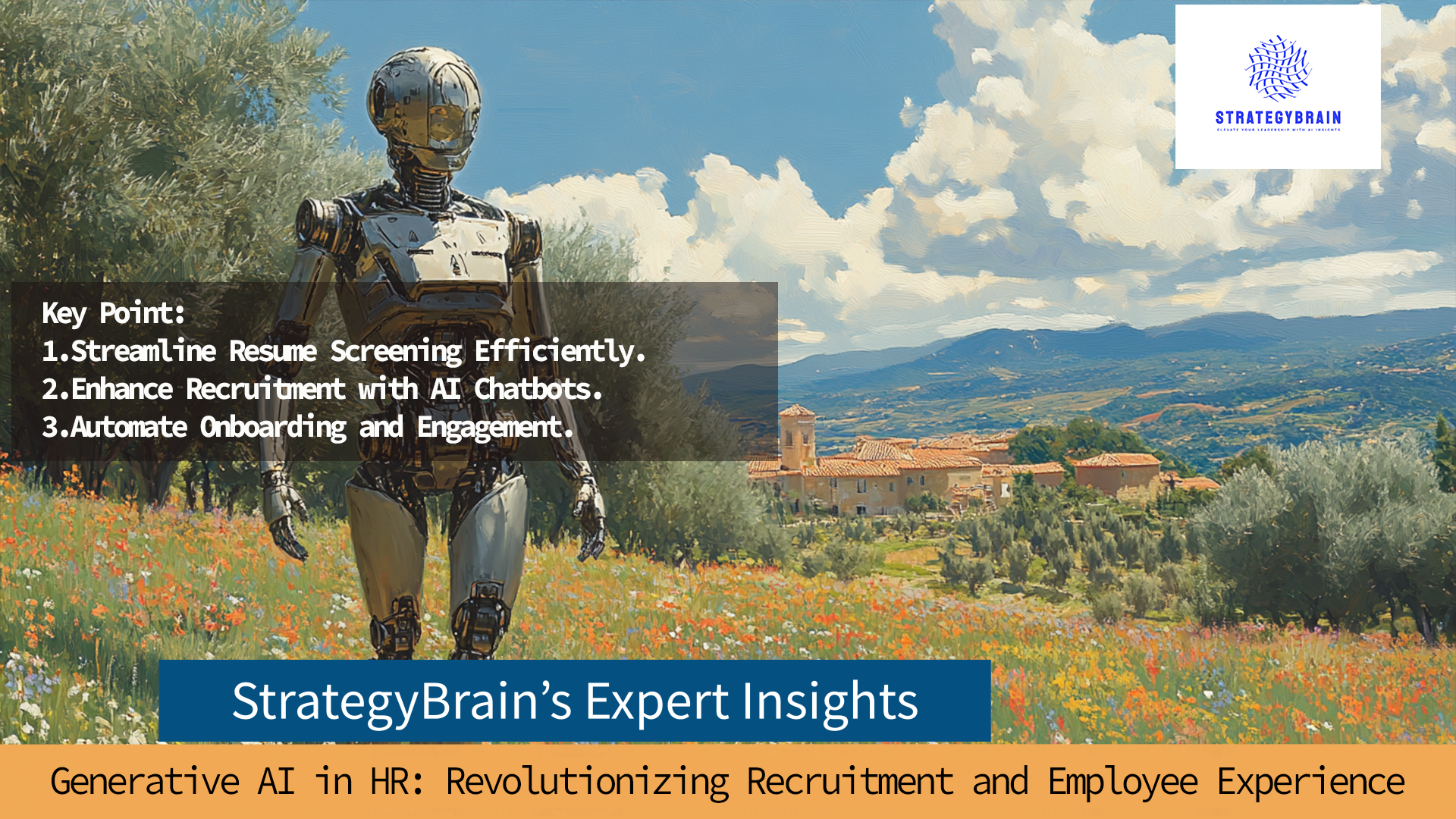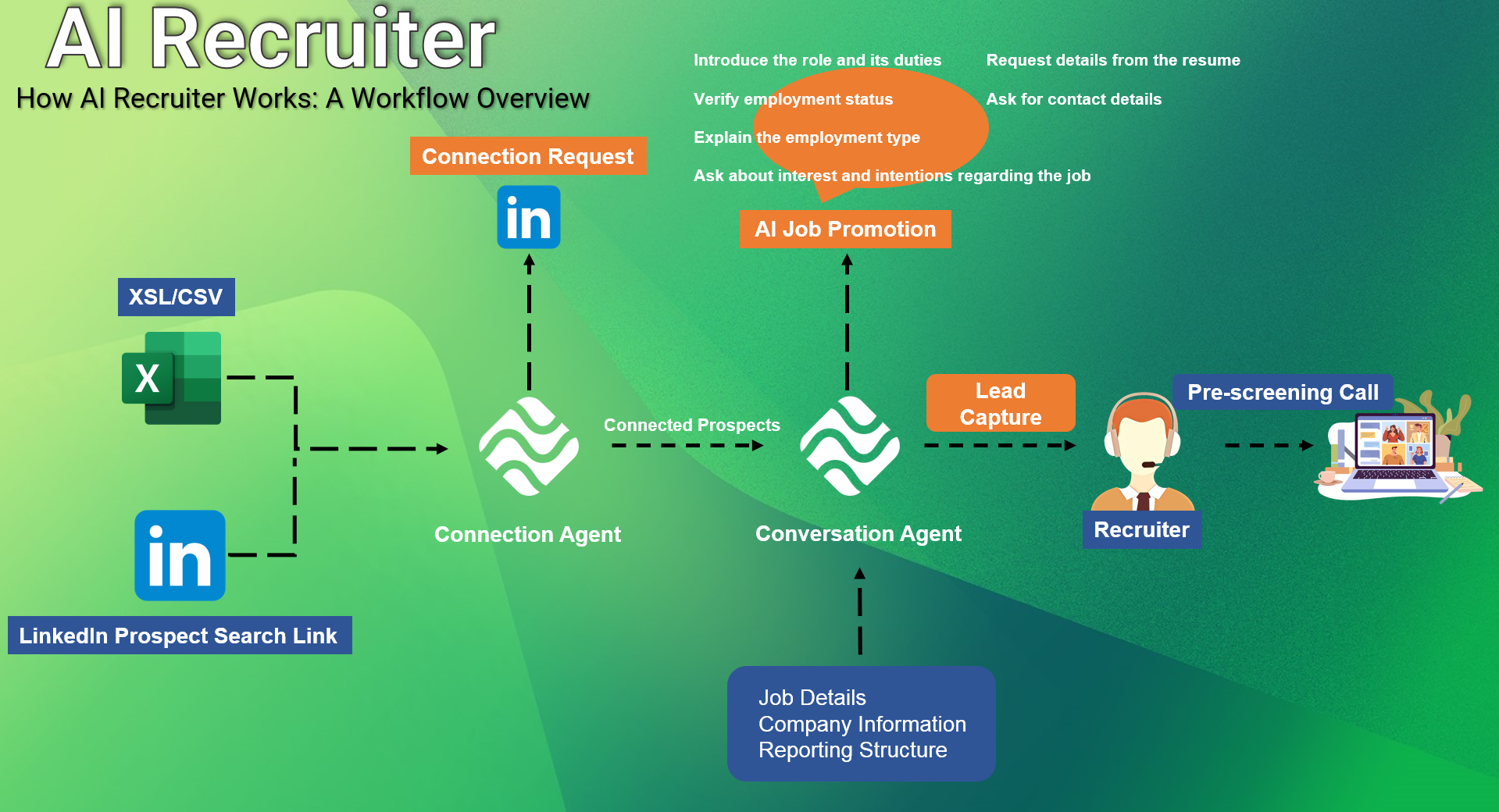Step into the future of HR, where the lines between human and machine collaboration are blurring. Generative AI is a breakthrough in artificial intelligence. It is not just a buzzword; it is a force that is changing how HR professionals work. It is redefining talent acquisition and workforce planning. Imagine a world where AI can write great job ads, analyze resumes with unmatched accuracy, and even conduct initial interviews. Join us to explore the vast potential of Generative AI to revolutionize HR and shape the future of work.
What is Generative AI?
Generative AI refers to AI systems that can create new content, including text, images, and videos, based on their training data. In HR, this technology can automate and improve many tasks. It can draft job descriptions and personalize employee experiences. Generative AI uses machine learning algorithms to predict, adapt, and evolve based on its input, making it a powerful tool for HR professionals.
The Role of Generative AI in HR
Generative AI has accelerated HR’s engagement with artificial intelligence like never before. Historically, AI tools in HR have been slow to adopt. However, GenAI technologies can create content from various sources and quickly summarize data, offering new, compelling capabilities.
- Current Use: Teams are using chatbots and testing AI in recruiting. As deployments boost efficiency and insights, HR’s use of GenAI will rise.
- Future Vision: Executive teams want HR for deeper insights and partnerships. GenAI makes this vision a reality.
Real-World Examples of Generative AI in HR
- AI Resume Analysis and Candidate Sourcing
One of the most time-consuming tasks in HR is sifting through countless resumes to find the right candidates. Generative AI can streamline this by analyzing resumes with unmatched speed and accuracy. Companies like HireVue use AI to screen and shortlist candidates, saving human recruiters a lot of time and effort. - Personalized Employee Experiences
Generative AI enhances the employee experience by providing personalized interactions. IBM’s Watson uses AI to create custom onboarding for new employees, helping them feel more connected and engaged from day one. Similarly, AI-driven platforms like BetterUp offer tailored coaching and development programs. - Chatbots for Enhanced Employee Engagement
Chatbots powered by Generative AI are transforming HR interactions with employees. Tools like Talla and Drift provide instant answers to employee questions, ranging from benefit inquiries to IT support. These chatbots save HR professionals time and provide employees with accurate, timely information.
Benefits of Generative AI in HR
- User Autonomy
Generative AI offers conversational workflows and tailored information that boost self-service adoption. Chatbots can quickly answer common HR questions, freeing up HR staff to focus on more strategic tasks. - Productivity and Experience Enhancements
Generative AI speeds up content creation and task automation, boosting engagement rates. Current use cases show up to three times faster content creation and over 50% automation in onboarding tasks. Additionally, recruiting engagement rates are twice as high compared to traditional methods. - Truly Personalized, “Always On” Delivery of HR Services
GenAI-based HR “copilots” offer real-time guidance for employees and managers. This technology helps HR understand employees better, tracking work rhythms, learning needs, vacation schedules, and goals. Managers can customize onboarding, inspire top performers, and get alerts to reconnect with disengaged team members.
Challenges and Ethical Considerations
- Data Privacy and Security
Generative AI can process vast amounts of data, highlighting the need for strong data privacy and security measures. HR must work with legal and IT to comply with GDPR and CCPA. - Reducing Bias in AI Systems
AI can reduce bias but also risks perpetuating existing biases if not properly managed. HR leaders must ensure AI systems use diverse datasets and regularly audit the systems to find and fix biases, promoting diversity and inclusion. - Navigating the Dynamics of AI and Human Collaboration
While GenAI can automate many tasks, a balance between AI and human input is essential. Decisions involving employee well-being and ethical considerations should remain under human oversight. HR professionals need training to work with AI, leveraging its abilities while keeping the human touch.
Case Study: Generative AI in a Global Industrial Goods Company Using Strategybrain AI for Recruitment
Objective: Show the potential uses of generative AI in HR with a global industrial goods company and Strategybrain AI’s recruitment features.
Scenario 1: Enhancing Productivity and Reducing Administrative Work
- Background: The company has heavy admin tasks, like resume screening, onboarding, and daily queries. These limit HRBPs’ ability to focus on strategic initiatives.
- Applications of Generative AI:
- Chatbots: Use AI chatbots to answer employee questions about policies, benefits, and IT support, reducing HR’s workload.
- Automation Solutions: Automate resume screening to quickly find and recommend suitable candidates, saving time.
- Effects:
- Time Savings: HRBPs free up 25% to 30% of their time.
- Productivity Improvement: More focus on employee development and strategic planning.
Scenario 2: Reinvesting Efficiency Gains into Strategic Development
- Background: Reinvest the time saved into strategic HR activities.
- Applications of Generative AI:
- HR Business Talent Strategist Role: Focus on employee interactions, managing change, and talent planning.
- Strategic Employee Interaction: Use feedback and performance data to create good development plans.
- Change Management and Strategic Planning: Use AI tools for change management and strategic planning.
- Effects:
- Productivity Enhancement: Drive effective employee interactions and organizational change.
- Strategic Development: Enhanced talent management and organizational growth.
- Employee Relations: Improved engagement and retention rates.
Scenario 3: Integration of Strategybrain AI Recruitment Features
- Background: Utilize Strategybrain’s AI recruitment software to enhance recruitment efficiency.
- Feature Details:
- Social Media Integration: Automate candidate sourcing and communication through platforms like LinkedIn.
- Job Description Analysis and Candidate Profiling: Create detailed candidate profiles and guide the recruitment process.
- Candidate Sourcing and Planning: Develop systematic sourcing plans.
- Automated Candidate Communication: Automate interactions to gauge interest, answer questions, and confirm interviews.
- Scaling Recruitment Challenges: Handle large volumes of candidate data, increasing recruitment efficiency.
- Effects:
- Increased Recruitment Efficiency: Enhanced automation and precision.
- Improved Candidate Experience: Optimized recruitment process and candidate interaction.
Expert Insights on Generative AI in HR
- Josh Bersin (HR and Learning & Development Expert): Generative AI boosts HR efficiency in recruitment and employee experience by automating tedious tasks and freeing time for strategic work.
- David Green (HR Data Analytics Expert): AI helps talent management with data-driven insights and better hiring, emphasizing the need for ethics.
- Jacqueline Goh (HR Technology Consultant): Generative AI personalizes employee experiences and automates tasks but raises issues with data privacy and fairness.
The Future of GenAI in HR
Anticipated Trends and Innovations:
The future looks bright with predictive analytics, VR, and AR merging with AI to improve training and development.
Evolving Role of HR Professionals:
As GenAI automates routine tasks, HR will shift focus to strategic initiatives, such as employee engagement and change management. Continuous upskilling will be necessary to leverage these technologies effectively.
Actionable Insights for HR Professionals:
- Understand Your Needs: Assess specific HR needs and identify where AI can add the most value.
- Choose the Right Tools: Select AI tools aligned with HR goals and proven success.
- Pilot Programs: Test AI tools in a controlled environment, gather feedback, and adjust before full deployment.
- Train Your Team: Ensure HR professionals understand how to use AI tools effectively and ethically.
- Monitor and Evaluate: Continuously assess the AI tool’s performance and impact on HR, improving as needed.
Conclusion
Generative AI is changing HR by improving recruitment and personalizing employee experiences. We must implement it thoughtfully, addressing ethics and privacy concerns. Embracing Generative AI puts HR at the forefront of a tech revolution, improving workforce management and shaping the future of work.
Are you ready to explore how Generative AI can redefine your HR practices and propel your organization into the future? By staying informed and proactive, HR leaders can unlock GenAI’s potential to create a more efficient, engaging, and fair workplace. The future of HR is here—don’t miss out on the opportunity to lead the charge.
FAQ: Transforming HR with Generative AI
-
Ensuring data privacy and security.
-
Reducing biases in AI.
-
Balancing AI and human input in decision-making.
-
Understand their needs.
-
Choose the right AI tools.
-
Run pilot programs.
-
Train their teams.
-
Continuously assess and refine the AI tools’ performance and impact.

